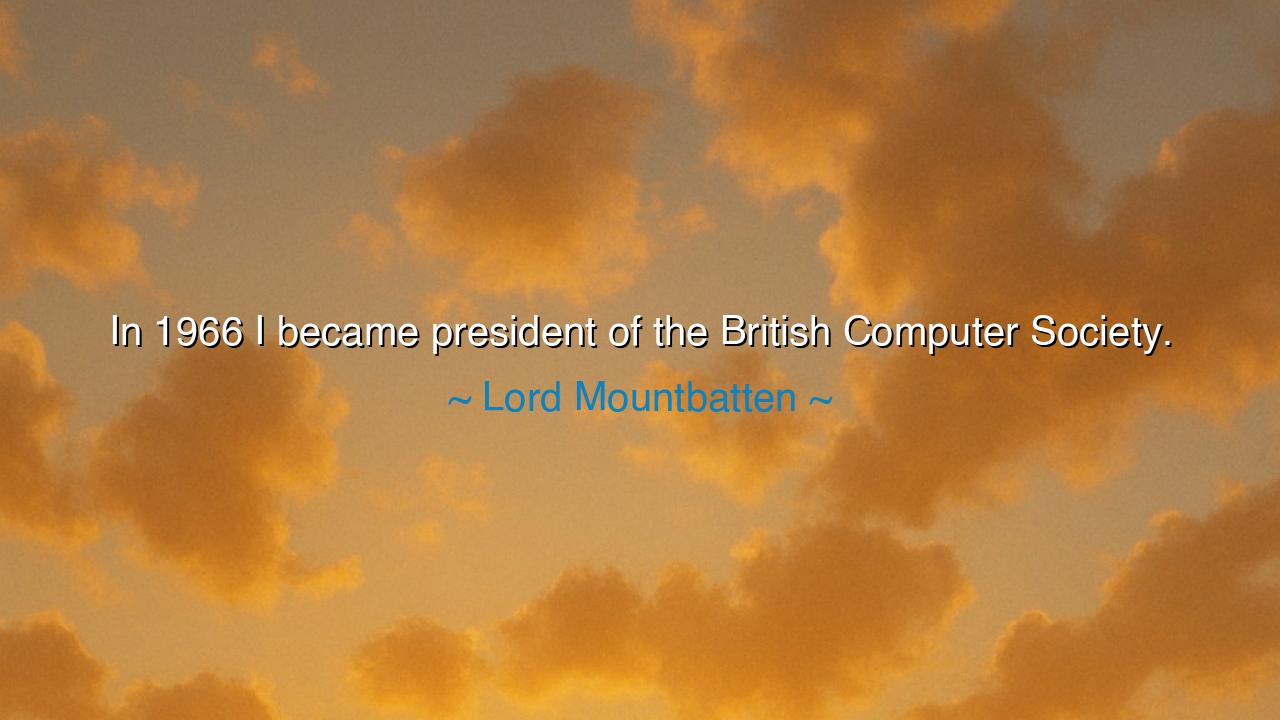
In 1966 I became president of the British Computer Society.






The words of Lord Mountbatten—“In 1966 I became president of the British Computer Society.”—seem, at first, a simple record of fact. Yet beneath them lies a tale of transformation, a moment when old traditions met the dawn of a new age. Mountbatten, a figure born into the world of empires, navies, and monarchies, stood at the threshold of the digital era. His appointment as president of the British Computer Society was not merely ceremonial—it symbolized the recognition that the future of nations would no longer be shaped by steel alone, but by circuits, codes, and the mysterious power of information.
The ancients often spoke of the moment when wisdom passes from one age to another. Just as Prometheus brought fire to humankind, so too did the pioneers of the computer age bring forth a new fire: the fire of calculation, automation, and infinite memory. Mountbatten, with his lineage tied to the grandeur of the past, bore witness to this new gift and lent his name and stature to its recognition. His words remind us that the computer revolution did not emerge in a vacuum but was welcomed and legitimated by leaders who saw its potential to transform society.
Consider the year 1966. It was a time when computers were no longer confined to military labs or cloistered universities. They were beginning to enter banks, industries, and government offices. The British Computer Society, formed a decade earlier, sought to guide this new profession with wisdom, ethics, and vision. To have Mountbatten as its president was to bridge two worlds: the world of old leadership, rooted in discipline and tradition, and the world of new innovation, driven by technology and imagination. This union gave credibility to a field still finding its place in society.
History gives us parallels. When the printing press emerged, it too required champions to validate its role in shaping civilization. Princes and scholars who embraced it ensured that knowledge spread far beyond monasteries. Likewise, when railways began to knit nations together, the blessing of statesmen made them arteries of progress. So it was with the rise of computing: the presence of leaders like Mountbatten at the helm of its institutions declared that this was not a passing novelty, but the foundation of the future. The British Computer Society, under his stewardship, became more than a guild of technologists; it became a guardian of a revolution.
This truth carries deep meaning: progress requires not only innovators but also leaders who see its importance and lend it legitimacy. A society advances not by invention alone, but by weaving invention into the fabric of culture, law, and governance. Mountbatten’s simple declaration—“In 1966 I became president”—is thus more than a personal note. It is a marker of how the digital age gained honor and recognition, setting the stage for the world we now inhabit, a world where computers guide our every step.
The lesson for us is profound: embrace the new, but guide it with wisdom. Innovation without guidance can become chaos; but when new power is joined with leadership and vision, it transforms civilization. Each generation must recognize the moment when a new force emerges, whether in technology, culture, or science, and must appoint wise guardians to steward its growth. For just as Mountbatten once lent his hand to computing, so must we lend ours to the forces shaping our present age.
Practically, this means not only celebrating innovation but taking responsibility for it. If artificial intelligence, biotechnology, or climate technology are the great powers of our time, we must ensure they are guided by ethics, compassion, and justice. Just as the British Computer Society sought to give order to the dawn of digital life, so too must we give order to the revolutions now unfolding before us.
Thus, the words of Mountbatten endure not as a mere note of office, but as a symbol of transition. “In 1966 I became president of the British Computer Society.” This was the moment when an ancient world embraced the future, when the old guard acknowledged the new frontier. Let us take from it the wisdom that progress is not only invention, but stewardship; not only power, but vision. And let us be ready, in our own age, to lend our strength to the shaping of the revolutions yet to come.






AAdministratorAdministrator
Welcome, honored guests. Please leave a comment, we will respond soon